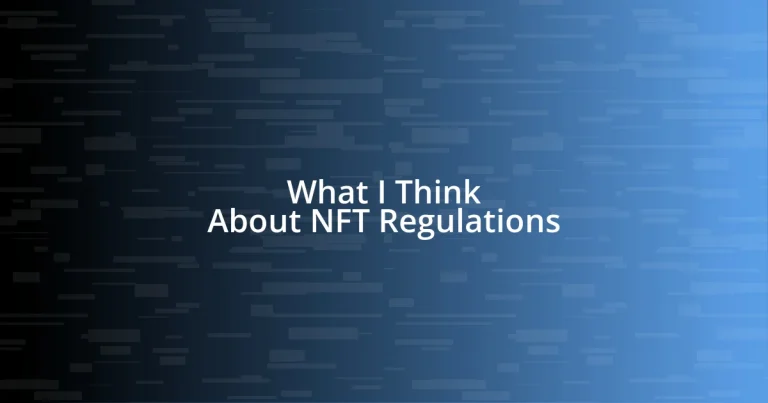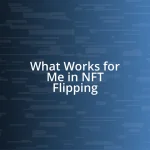Key takeaways:
- Understanding NFT regulations is crucial for creators and collectors to navigate legal complexities and ensure compliance across different jurisdictions.
- Clear regulations foster consumer trust, encouraging investment in NFTs while promoting innovation by reducing fears of legal repercussions for creators.
- Future trends in NFT regulations may include harmonized global standards and regulatory sandboxes, fostering collaboration among stakeholders to create a supportive environment for the NFT ecosystem.
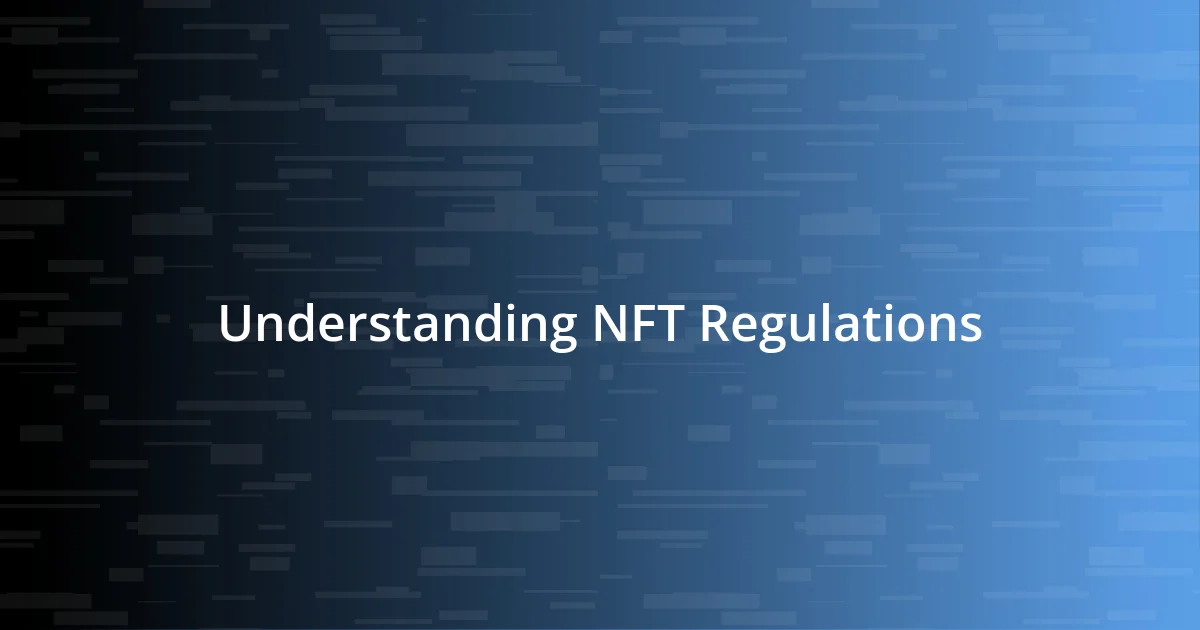
Understanding NFT Regulations
Understanding NFT regulations can feel like navigating a labyrinth. I remember attending a virtual seminar where experts debated the nuances of these regulations. It struck me how varied the interpretations were, leaving many of us questioning: How can we ensure compliance while also fostering creativity in the NFT space?
These regulations often intersect multiple areas, including intellectual property, securities law, and tax implications. I once worked with an NFT creator who was genuinely surprised to discover that their art could be classified under different legal frameworks. It underscored for me the importance of understanding these regulations—not just for legal safety, but for the peace of mind they can provide creators and collectors alike.
Additionally, the global nature of NFTs complicates matters further. I’ve spoken with artists from various countries, and their experiences with local regulations differ greatly—but they all share a common anxiety about potential repercussions. Isn’t it fascinating how a digital asset can lead to such varied legal conversations across borders? Understanding these regulations isn’t just about compliance; it’s about navigating the broader implications for our digital future.
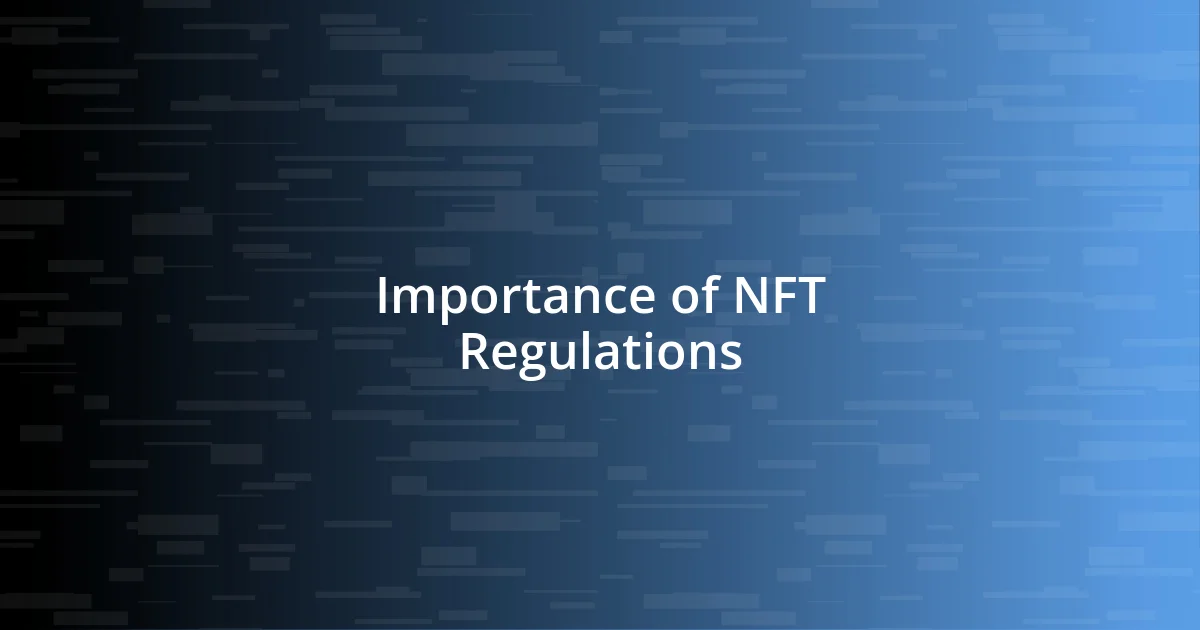
Importance of NFT Regulations
Regulating NFTs is crucial for fostering a secure environment for both creators and collectors. I recall a recent chat with a fellow artist who had just released her first NFT. She felt vulnerable and apprehensive, worried about the potential legal ramifications surrounding her work. That conversation opened my eyes to how many creators are out there, ripe with talent but paralyzed by uncertainty. Regulations provide clarity, helping pave the way for innovation without fear of infringement or loss.
On a broader scale, NFT regulations are essential for building consumer trust in this burgeoning market. I remember when I first ventured into buying NFTs; I relied heavily on the reputation of the platforms I used. Since then, I’ve come to realize that robust regulations could enhance my confidence in the purchase process, knowing there’s a safety net in place. With more surety, collectors may be encouraged to invest in NFTs, thus driving the entire ecosystem forward.
Finally, the implementation of clear NFT regulations can act as a guiding light for future technological advancements. Not long ago, I attended an exhibition showcasing AI-generated NFTs. The artists were wildly creative, yet many expressed concerns over the legal landscape they were navigating. If we can introduce effective regulations, we’ll not only protect existing creators but also inspire future innovators, enabling a vibrant creative economy that can adapt to shifting landscapes.
| Benefit | Importance |
|---|---|
| Legal Clarity | Provides understanding of rights and responsibilities. |
| Consumer Trust | Enhances confidence in buying and selling NFTs. |
| Promotion of Innovation | Encourages creativity by reducing fears of legal repercussions. |
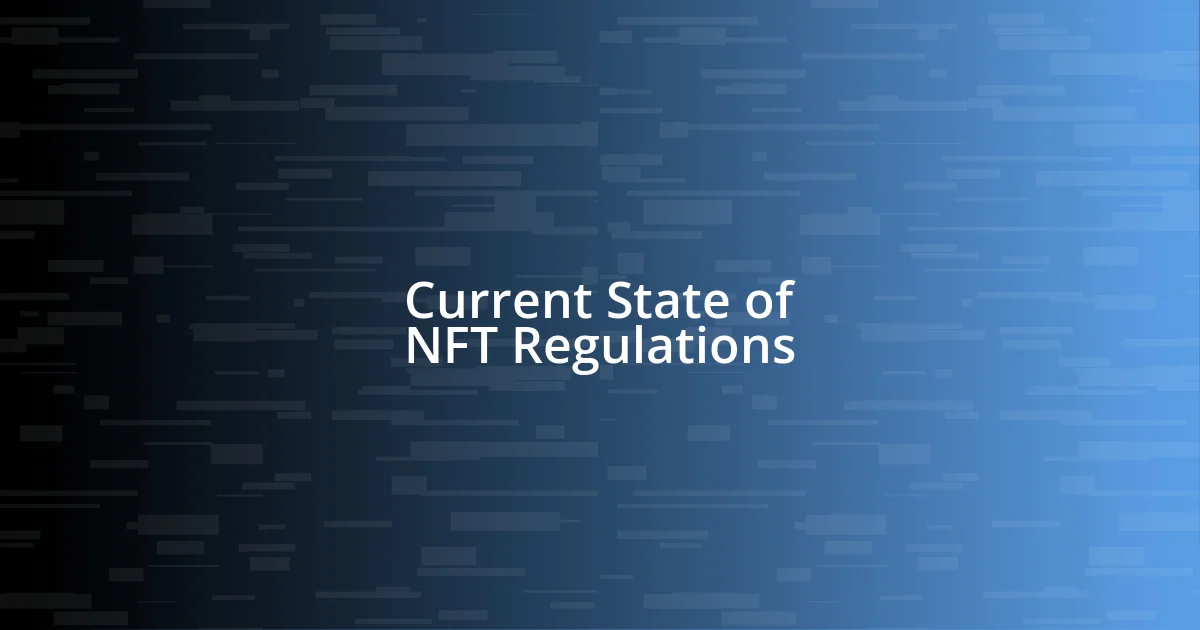
Current State of NFT Regulations
The landscape of NFT regulations is shifting rapidly, and it can be dizzying to keep up with the changes. I recall a discussion with a friend who invested in NFTs last year; she was disheartened when a popular marketplace she used was suddenly under scrutiny by regulators. That incident highlighted how volatile this space can be—one day, everything seems fine, and the next, artists and buyers are left in a legal gray area. I genuinely believe that these developments show just how urgently we need clear frameworks to protect everyone involved.
- Diverse Global Standards: Many countries are still figuring out how to categorize NFTs, leading to inconsistent approaches.
- Ongoing Legislative Efforts: Governments are increasingly introducing bills that specifically address the treatment of digital assets, which reflects a more engaged approach to regulation.
- Industry Self-Regulation: Some platforms are starting to adopt their own standards for transparency and customer protections, showcasing a proactive approach amidst uncertainty.
It’s fascinating to observe how these various regulatory movements intertwine and influence the market. I once bought an NFT that turned out to be a digital rights nightmare, where the creator hadn’t properly secured the intellectual property. That experience was both frustrating and eye-opening. It cemented my belief that clearer regulations would not only protect buyers like me but would also empower creators to thrive without fear of legal mishaps. The reality is that until we find a balance, both parties will continue to navigate challenges that keep us all on our toes.
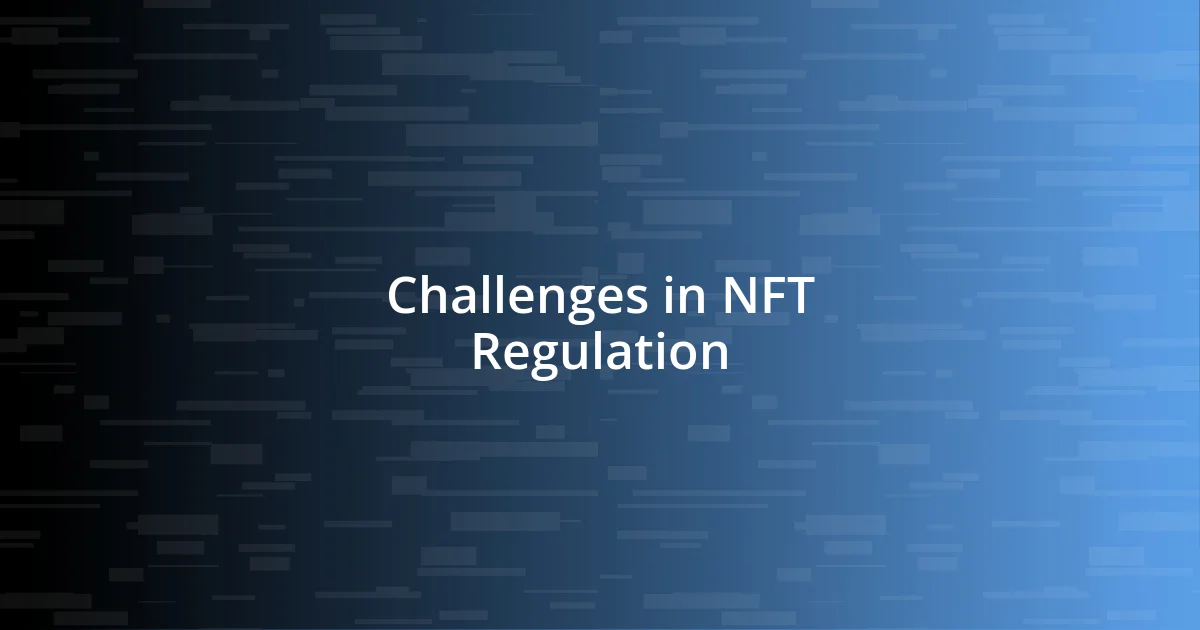
Challenges in NFT Regulation
Navigating the complexities of NFT regulations feels like walking a tightrope. One evening, while pondering my recent NFT purchases, I felt a wave of unease wash over me. What if a sudden regulatory change left my investments hanging in the balance? This uncertainty isn’t just a personal concern; it strikes at the heart of the NFT community. Creators and collectors alike grapple with the fear of capricious legal decisions that could undermine their work or investments overnight.
As I explored various platforms, I encountered creators who were unsure whether their pieces qualified as art or financial assets. The lines between digital art and securities often seem blurred, leaving many artists scrambling for clarity. I remember speaking with a digital artist who was caught off guard by her latest NFT sale being labeled as a potential investment contract. It made me realize how crucial it is for regulations to be carefully defined—without this, misunderstanding could stifle creativity and innovation in the NFT space.
Moreover, the pace at which regulations evolve can leave many behind. I once attended a webinar about NFT compliance that felt outdated the moment it ended, as new guidelines had just emerged. This fast-changing nature not only confuses creators but also renders compliance efforts nearly futile. If we are to establish a robust regulatory framework, it needs to keep pace with technological advancements and provide solid foundations that encourage growth rather than stifle it. Isn’t it time we prioritize stability in this enticing yet precarious marketplace?
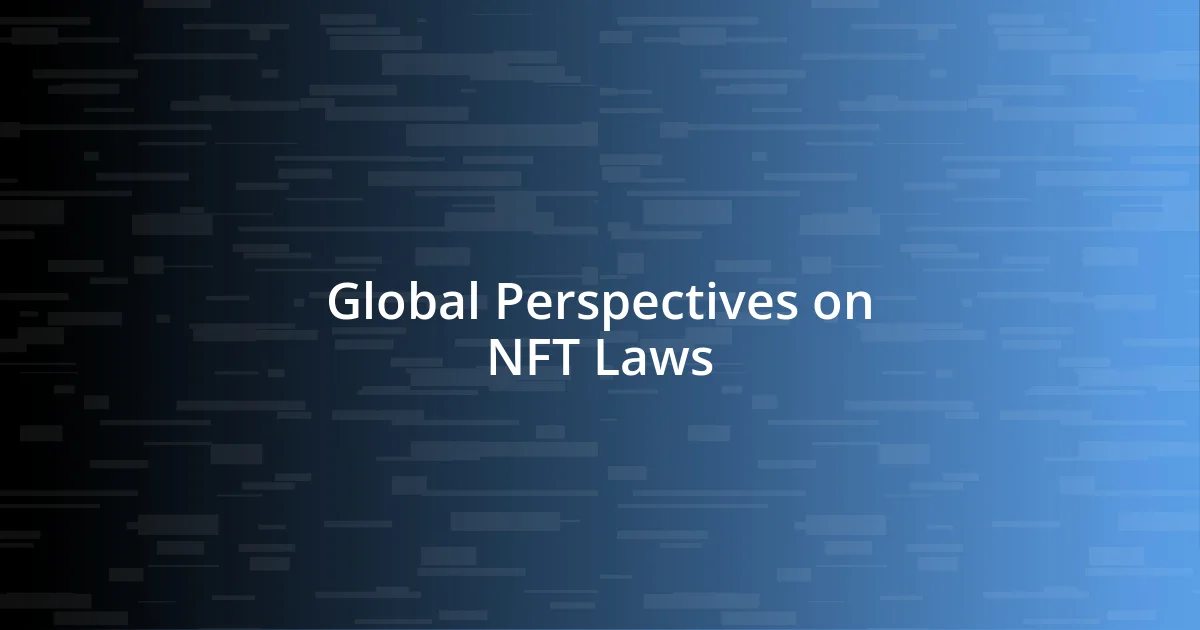
Global Perspectives on NFT Laws
It’s fascinating to see how different countries approach NFT regulations, often reflecting their unique perspectives on digital assets. I remember hearing about how Japan recognizes NFTs as a form of intellectual property, while in regions like the European Union, discussions continue around broader digital asset regulations. This dichotomy can be bewildering; one moment, I’m excited about a new project, and the next, I’m left pondering whether it even fits within the legal landscape where I reside. How do creators make sense of their rights when the rules are so varied?
I’ve noticed that some governments are taking a more proactive stance, pushing for legislation that offers clarity. For instance, I stumbled upon an article detailing how the U.S. is considering frameworks that specifically address NFTs. It made me think back to one of my purchases—a limited edition digital art piece. Knowing that legislation might soon provide clearer definitions made me feel a mix of hope and apprehension. Would it benefit my investment, or would it lead to unforeseen restrictions? These are questions that many of us are grappling with as the landscape evolves.
While the regulatory landscape remains inconsistent, I’ve seen industry players attempt to navigate this chaos through self-regulation. A friend working at a digital marketplace shared how they implemented new standards to enhance transparency amidst the uncertainty. It made me appreciate their efforts, but I couldn’t help but wonder: is voluntary self-regulation enough to protect the community? When creators and collectors are left to fend for themselves in a complex legal maze, it raises concerns about the sustainability of the NFT ecosystem.
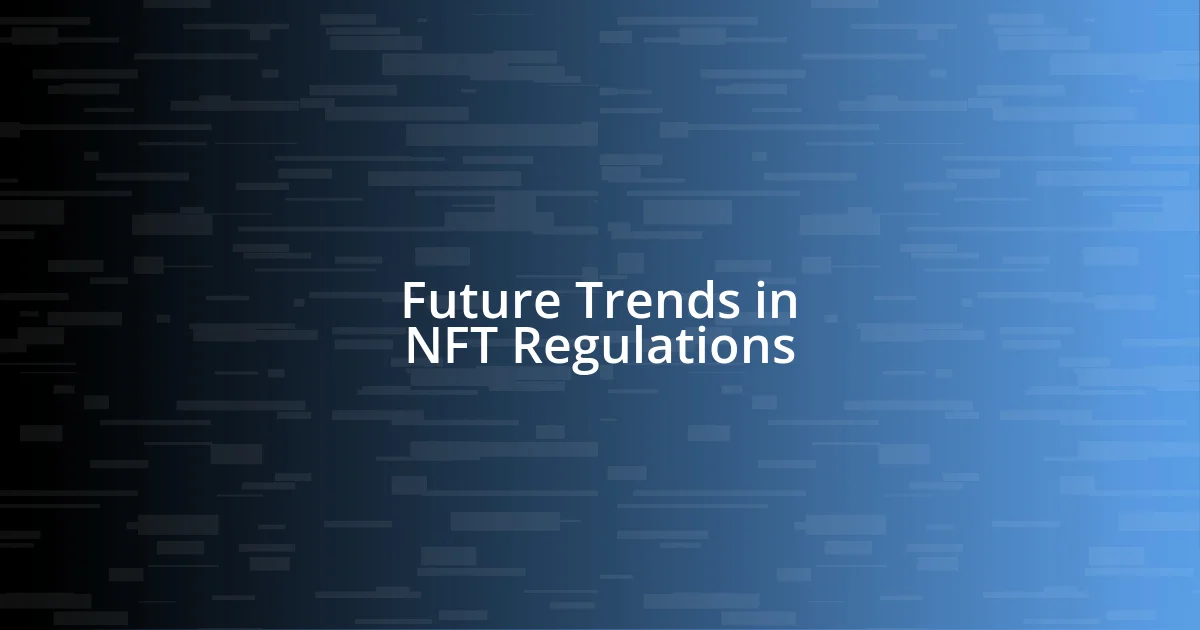
Future Trends in NFT Regulations
The future of NFT regulations is poised for significant shifts as more jurisdictions begin to recognize the need for a cohesive framework. I recently attended a conference where experts discussed how harmonized global regulations could emerge. Imagine the relief for creators and collectors alike, knowing their rights and obligations are clear across borders. Wouldn’t that introduce a new era of creativity and confidence in the NFT space?
I’m particularly intrigued by the rising trend of regulatory sandboxes. These controlled environments allow startups to test their NFT products under regulatory oversight without the burden of full compliance from the get-go. One time, while discussing this with a fellow enthusiast, I felt a spark of optimism. It dawned on me that this could foster innovation while ensuring necessary protections. But then, is it enough to address the complexities unique to each NFT?
As we peek into the future, I believe we’ll see more collaborative efforts among stakeholders—governments, artists, and platforms—coming together to refine these regulations. During a recent chat with a blockchain developer, we pondered whether this collaboration could lead to a shared code of ethics that protects artists and investors. The optimism in that discussion was palpable, but it also gave rise to a concern: what happens if certain voices are left out? Would that compromise the integrity of our ever-evolving marketplace?
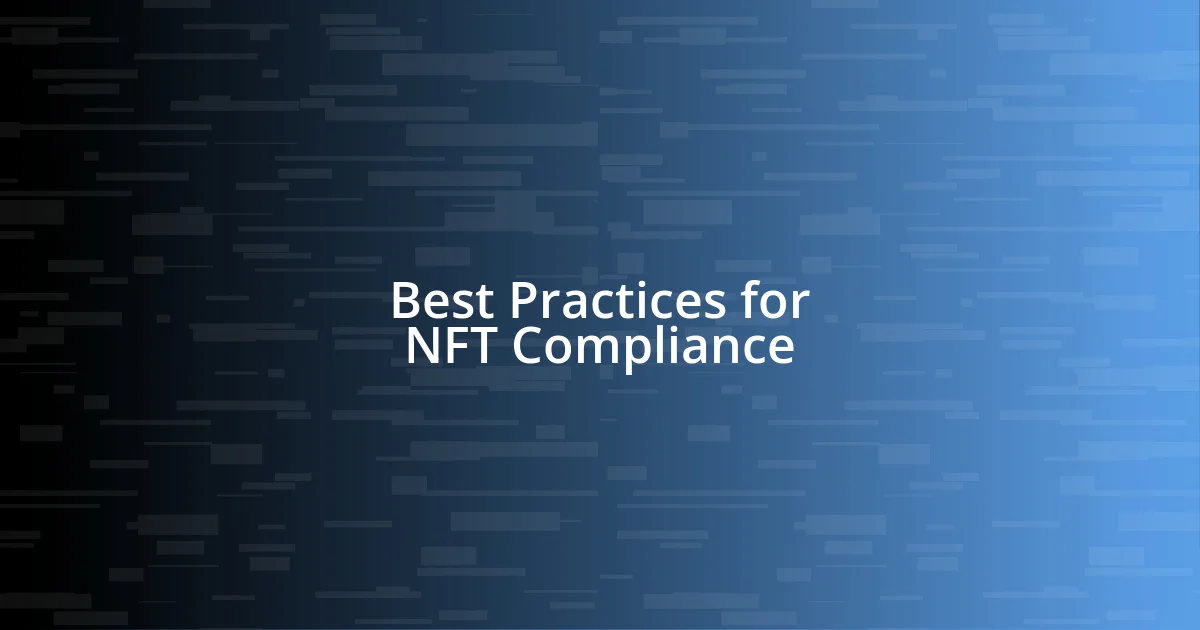
Best Practices for NFT Compliance
Ensuring compliance with NFT regulations starts with awareness. I recall when I first jumped into the NFT scene; I was so dazzled by the art that I overlooked important legal aspects. This naivety isn’t uncommon. It’s essential for creators and collectors to educate themselves about the regulations in their region, from intellectual property rights to tax implications. Have you ever wondered how a simple oversight could lead to potential legal troubles? Trust me, staying informed can save you a world of headaches.
Another practice I highly recommend is keeping clear records of transactions. I learned this the hard way after a complicated purchase left me scrambling to prove ownership. Documenting your purchases, sales, and agreements isn’t just smart; it’s necessary. This way, if disputes arise or the law changes, you have a solid foundation to protect your interests. How comforting would it feel to have everything neatly organized in case you need to reference it later?
Finally, collaboration is key. I often think back to a meetup I attended with fellow NFT enthusiasts, where we shared experiences and insights about compliance. Having a community around you can be invaluable. Whether it’s joining forums, attending workshops, or simply reaching out to mentors, surrounding yourself with knowledgeable people enhances your understanding of compliance issues. Who knows? You might just find that one nugget of advice that changes the way you navigate your NFT journey.












